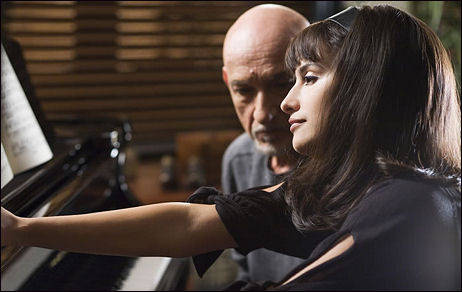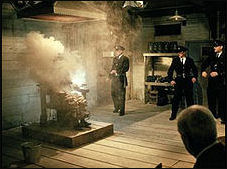“Mrs. Clinton is losing this thing,” says Wall Street Journal columnist Peggy Noonan in a 2.8 piece called “Can Mrs. Clinton Lose?” “It’s not one big primary, it’s a rolling loss, a daily one, an inch-by-inch deflation. The trends and indices are not in her favor.
“She is having trouble raising big money, she’s funding her campaign with her own wealth, her moral standing within her own party and among her own followers has been dragged down, and the legacy of Clintonism tarnished by what Bill Clinton did in South Carolina. Unfavorable primaries lie ahead. She doesn’t have the excitement, the great whoosh of feeling that accompanies a winning campaign. The guy from Chicago who was unknown a year ago continues to gain purchase, to move forward. For a soft little innocent, he’s played a tough and knowing inside/outside game.
“The day she admitted she’d written herself a check for $5 million, Obama’s people crowed they’d just raised $3 million. But then his staff is happy. They’re all getting paid.
“Political professionals are leery of saying, publicly, that she is losing, because they said it before New Hampshire and turned out to be wrong. Some of them signaled their personal weariness with Clintonism at that time, and fear now, as they report, to look as if they are carrying an agenda. One part of the Clinton mystique maintains: Deep down journalists think she’s a political Rasputin who will not be dispatched. Prince Yusupov served him cupcakes laced with cyanide, emptied a revolver, clubbed him, tied him up and threw him in a frozen river. When he floated to the surface they found he’d tried to claw his way from under the ice. That is how reporters see Hillary.
“And that is a grim and over-the-top analogy, which I must withdraw. What I really mean is they see her as the Glenn Close character in Fatal Attraction: “I won’t be ignored, Dan!”
“Mr. Obama’s achievement on Super Tuesday was solid and reinforced trend lines. The popular vote was a draw, the delegate count a rough draw, but he won 13 states, and when you look at the map he captured the middle of the country from Illinois straight across to Idaho, with a second band, in the northern Midwest, of Minnesota and North Dakota. He won Missouri and Connecticut, in Mrs. Clinton’s backyard. He won the Democrats of the red states.
“On the wires Wednesday her staff was all but conceding she is not going to win the next primaries. Her superdelegates are coming under pressure that is about to become unrelenting. It was easy for party hacks to cleave to Mrs. Clinton when she was inevitable. Now Mr. Obama’s people are reportedly calling them saying, ‘Your state voted for me and so did your congressional district. Are you going to jeopardize your career and buck the wishes of the people back home?’
“Mrs. Clinton is stoking the idea that Mr. Obama is too soft to withstand the dread Republican attack machine. (I nod in tribute to all Democrats who have succeeded in removing the phrase ‘Republican and Democratic attack machines’ from the political lexicon. Both parties have them.) But Mr. Obama will not be easy for Republicans to attack. He will be hard to get at, hard to address. There are many reasons, but a primary one is that the fact of his race will freeze them. No one, no candidate, no party, no heavy-breathing consultant, will want to cross any line — lines that have never been drawn, that are sure to be shifting and not always visible — in approaching the first major-party African-American nominee for president of the United States.
“He is the brilliant young black man as American dream. No consultant, no matter how opportunistic and hungry, will think it easy — or professionally desirable — to take him down in a low manner. If anything, they’ve learned from the Clintons in South Carolina what that gets you. (I add that yes, there are always freelance mental cases, who exist on both sides and are empowered by modern technology. They’ll make their YouTubes. But the mad are ever with us, and this year their work will likely stay subterranean.)
“With Mr. Obama the campaign will be about issues. ‘He’ll raise your taxes.’ He will, and I suspect Americans may vote for him anyway. But the race won’t go low.
“Mrs. Clinton would be easier for Republicans. With her cavalcade of scandals, they’d be delighted to go at her. They’d get medals for it. Consultants would get rich on it.
“The Democrats have it exactly wrong. Hillary is the easier candidate, Mr. Obama the tougher. Hillary brings negative; it’s fair to hit her back with negative. Mr. Obama brings hope, and speaks of a better way. He’s not Bambi, he’s bulletproof.
“The biggest problem for the Republicans will be that no matter what they say that is not issue oriented — ‘He’s too young, he’s never run anything, he’s not fully baked’ — the mainstream media will tag them as dealing in racial overtones, or undertones. You can bet on this. Go to the bank on it.
“The Democrats continue not to recognize what they have in this guy. Believe me, Republican professionals know. They can tell.”








